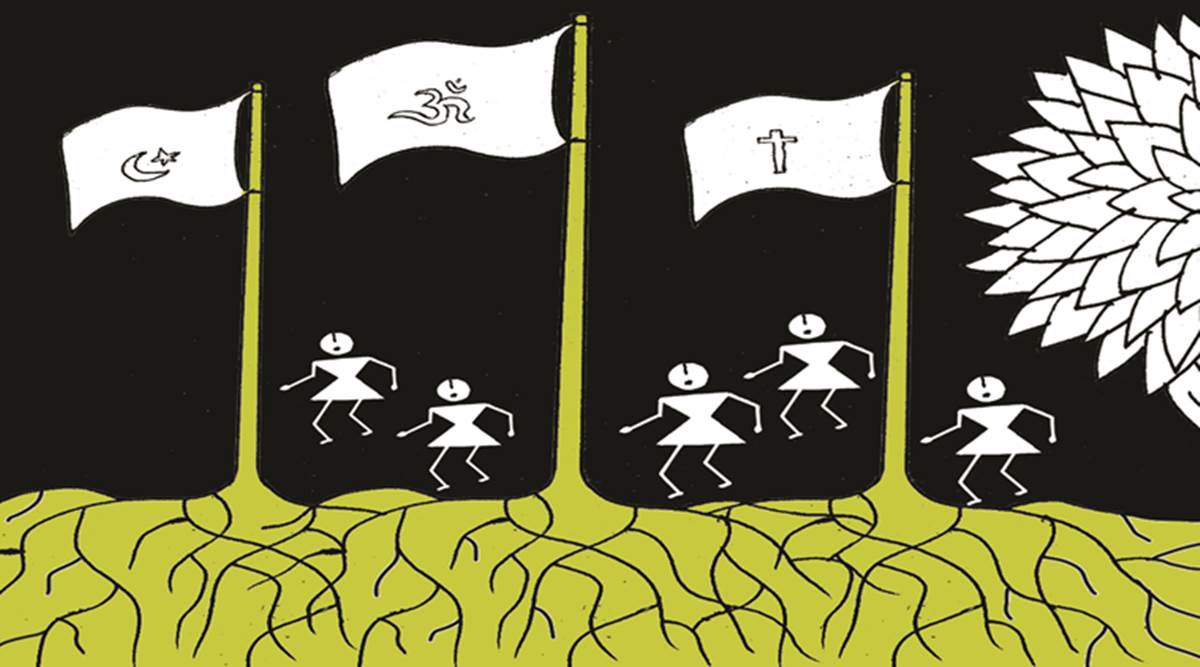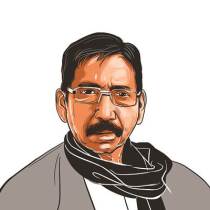Mainstreaming Adivasis?
Fellow Adivasis are competing against each other assuming that the well-being of Adivasis is their individual responsibility. In this competition, Adivasis themselves are getting killed.

Adivasis, the original inhabitants of the Earth, who lead their lives living by the rules of nature, are labelled superstitious. (Illustration: C R Sasikumar)
Nature is science. The one who understands the ways of nature is a scientist. Newton figured out gravity, he was called a scientist. However, Adivasis, the original inhabitants of the Earth, who lead their lives living by the rules of nature, are labelled superstitious.
In 2005, when earthquake and tsunami rocked the Andaman and Nicobar Islands, scientists from across the globe expected that the Jarawa Adivasi tribe would be washed away. However, members of the tribe emerged from their forest habitat and announced that all their fellow tribespeople had survived. The scientists were taken by surprise. And once again the need for studying Adivasis was debated.
Fellow Adivasis are competing against each other assuming that the well-being of Adivasis is their individual responsibility. In this competition, Adivasis themselves are getting killed. Today, among Adivasis, a certain one claims to be a Hindu; the other says he is a Christian; and someone else has adopted Islam. They also talk about political preferences, some have become Congressmen, some have chosen the BJP and others claim to be Communists. In this struggle, Adivasi brotherhood has been broken.
The people who work for the betterment of Adivasis are also the ones seeding politics and religion among the community. It is seen that instead of making Adivasis self-dependent, these people are taking away their independence and establishing their own dominance.
It is usually said that India is on the path of rapid development and progress. What does this mean? Whose development are we talking about? How much share of this development does a citizen enjoy? How much is the share of agricultural workers and labourers? This is ambiguous. At the foundation of this rapid development lie exploitation, oppression, dominance, and inequality. Adivasis don’t subscribe to this definition of development. If Adivasis blindly accept this recipe, they are lauded, otherwise they are cursed: “How much ever one tries, Adivasis won’t improve”.
In order to work out the right model for Adivasi development, one must take a deep dive into history. One has to learn about their way of life, their values, and figure out an approach for their all-round development. In that sense, Birsa Munda called for Ulgulan, which refers to simultaneous and overall development of the economic, social, academic, cultural and political facets of the community.
The Tribal Development Department employs several programmes for the development of Adivasis. For cultural development, Adivasis were provided musical instruments for bhajans and kirtans. And sets of band-baja (orchestra) were distributed among youth in order to make them employable. As a result, Adivasis are getting more fascinated towards band-baja, so much so that the significance of traditional dhol in their cultural programmes is plummeting. Handing band-baja to Adivasis is in a way an attack on their culture.
One Adivasi lost his life to the attraction of band-baja in Damalde village in Maharashtra’s Shahada taluka. The Adivasis in the village had unanimously decided against renting band-baja for weddings as it was expensive. But when a wedding came up, members of a family insisted on having it. The father tried to convince the mother and son, but the duo were adamant. The father eventually hanged himself.
If the government wishes for cultural development of Adivasis, provide them traditional musical instruments like dhol, biri and toor. If they are not well-versed with the instruments, teach them how to play.
Everybody assumes Adivasis are incapable of enriching their lives. That is why people from different religious sects try to woo them and make them take up a religion.
They say we need to bring Adivasis into the mainstream. One wonders, are Adivasis the only people left out from the mainstream? Has everybody else become part of the mainstream? And if that is the case, why do farmers commit suicide? Why do we hear of rape crimes every other day? Then why must Adivasis become part of this mainstream, which fosters exploitation, oppression, dominance and inequality?
The attempts to make Adivasis part of the mainstream are attempts to destroy the their culture, that is driven by hard work, collective action and cooperation. Therefore, it is necessary to define ‘mainstream’. Do they who are building this so-called mainstream feel the need for Adivasi participation in the building process? Today, human beings are being exploited on the basis of religion, culture, economic background, social status and gender. The stream that enables freedom from this exploitation and inequality is the mainstream. This should be the ideal definition of mainstream.
Adivasi culture existed long before religion found its roots. It is a rich culture of human values. It is important for human beings to protect these values. We all have to work together to build a mainstream that embraces human values and eliminates hatred, violence, injustice, corruption and belligerence, and then will human life become peaceful, trustful, and filled with love and affection towards one another. Such a mainstream will lead to human development in the true sense of the term. Let’s endeavour to build this mainstream together.
Sonawane is a Bhil Adivasi poet This article was translated from Marathi by Rushikesh Aravkar
For all the latest Opinion News, download Indian Express App







































No hay comentarios:
Publicar un comentario